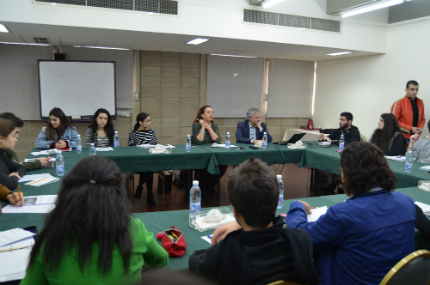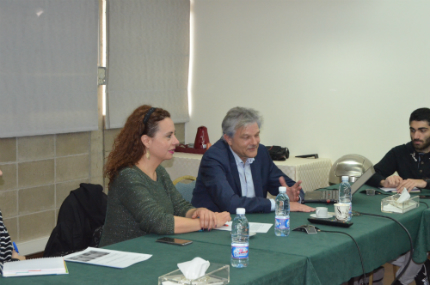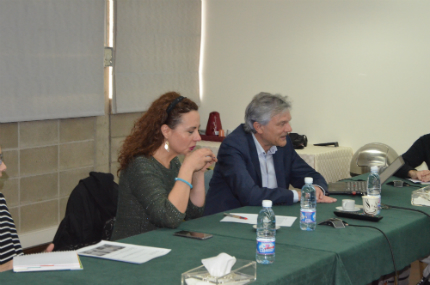LAU holds a lecture with Professor Martin Beck
On January 25th, 2017, the Institute for Social Justice and Conflict Resolution (ISJCR) and the Department of Social Sciences at the Lebanese American University hosted a guest lecturer, Professor Martin Beck, who currently holds the position of Chair of contemporary Middle East studies at the University of Southern Denmark. The lecture was convened by ISJCR associate director, Dr. Tamirace Fakhoury, in the framework of her class on Political Theory.

Professor Beck tackled the Lebanese response to the Syrian refugee surge through a mixed lens combining constructivist and realist perspectives. He began his presentation with an analytical overview of the refugee situation in Lebanon: Lebanon is a rather small country with the highest refugee density in the world. When compared to European countries’ figures regarding their reception of Syrian refugees, we find that the underlying “crisis” in Lebanon is way more acute than in Europe. Nevertheless, the Lebanese government has opted for a rather mild level of “securitization”.
In what follows, Prof. Beck tries to explain why Lebanon has not enforced at the beginning of the refugee surge extraordinary measures to control the exceeding influx of migrants. His overarching question revolved around unpacking why Lebanon hasn’t instigated securitization processes the same way European countries have done
To tackle this problématique from a positivist approach, he proposed three levels of analysis:
First, on the societal level, the majority of the Lebanese population has not expressed any ideological defense against the influx. This is due to the “Welcome culture” embedded in its core values system. In addition, no homogeneous nationalistic thoughts or feelings have been able to prevail against the influx, simply because of the diversity in ideologies that range from Pan-Arabism to Christian Phoenicianism. Furthermore, the concept of a “diffuse-reciprocity” is introduced to remind us of the Lebanese historical background, haunted with memories of its own civil war. The Lebanese community went through a lethal conflict and a huge proportion of the population assumed the same “displaced” status. Adding to this, Lebanon is characterized with a high diversity of religious beliefs. The Lebanese state has engaged throughout history with various minority groups. It is worth adding here that policy makers are not keen on acutely politicizing the file of the Syrian refugee influx the way they have previously done with the Palestinians. They have in one way or another learned from history especially when it comes to the heavy price of violent polarization.

Second, on the socio-economic level, Lebanon has welcomed an influx of unskilled labor, which has produced both economic “winners” and “losers”. Evidently, losers are the Lebanese lower classes, which could not compete with the highly contracted wages paid for the labor of refugees. As for the winners, it was mostly the middle and the upper classes that benefitted from the creation of new jobs in the educational and health sectors, for example.
Third, on the state level, Prof. Beck speaks of a certain “flexibility” expressed by a “weak” State: the Lebanese government is not really the most efficient one. Its problem-solving capacities are quite limited. But as denoted by the lecturer: “Sometimes, a state’s weakness can turn into strength.” In fact, the Lebanese government’s inactivity might have benefitted everyone. It gave agency to other more efficient actors to take charge of “processing” the influx of immigrants: International organizations, such as the UN, which took care of the registration process, basic relief and protection tasks; individual ministries such as the Ministry of Education, the private sector and civil society, which played a role in providing work and housing; and finally, some formal governmental institutions such as the Internal Security forces (and perhaps some informal, irregular actors such as Hezbollah). Nevertheless, some deregulated rent-seeking and exploiting behaviors by Lebanese businessmen and landowners can be observed.

The lecture ended with a reflective outlook on the situation, where Lebanon’s flexible response to the high influx of immigrants could metamorphose into a strictly securitized one, especially with the recent election of the new President and the formation of a new cabinet. However, Prof. Beck suggested that that the system has by now adapted to a presupposed “crisis” that has not really materialized. And anyhow, even if we assume that the state would become more repressive in dealing with the Syrian refugee influx, the logistical challenges related to expelling Syrian refugees out of Lebanon are of infinite encumbrance, and are virtually unmanageable. In his personal opinion, he does not foresee any exacerbated securitization procedure that would cause a dramatic shift in the situation.
The lecture was complemented by a Q&A session in which both students and LAU professors engaged in a lively constructive discussion with Prof. Beck.
Story written by the student Pascal Damien.